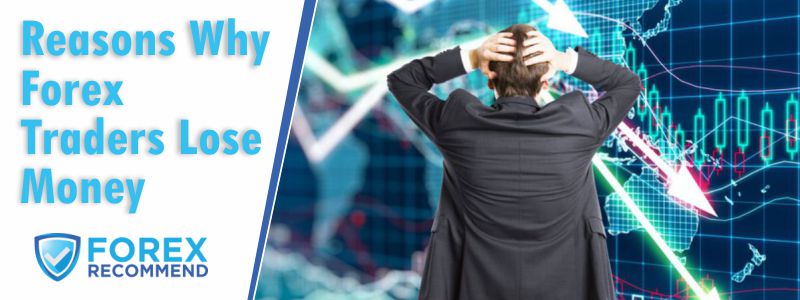
When forex traders start visiting the websites of brokers and trading platforms, they will be met with various risk warnings. These risk warnings claim that between 70% to 80%, and even up to 90% of forex traders lose their investment when they trade forex and CFD financial instruments, resulting in these forex traders giving up, never to return.
According to statistics, most traders will fail at some point in their trading journeys. This is not to discourage traders but to make them aware of the reality that forex and CFD trading is extremely risky. While traders are trying to earn a profit in volatile financial markets, they are simultaneously working to protect their investment, and some traders never learn how to balance this perfectly.
Any type of forex and CFD trading requires a significant amount of education, dedication, planning, and constant adaptation to changing conditions in unpredictable markets. To understand where most traders fail and to give traders a chance to avoid making these mistakes, we have drafted a comprehensive list containing 14 reasons why forex traders lose money these are:
- Poor Risk Management
- Not accepting responsibility for losses and mistakes
- Overtrading
- Risking too much
- No trade management
- Not having a trading strategy
- Unrealistic Expectations
- Trading Addiction
- Emotional Trading
- Refusing to Be Wrong
- Not effectively managing Leverage
- Trying to learn through trial and error
- Failing to adapt to the market
- Trading without a plan
Top 10 Forex Brokers
Broker
Rating
Regulators
Min Deposit
Leverage
Website
Top 10 Forex Brokers
Broker
Rating
Min Deposit
Leverage
1. Poor Risk Management
Forex traders lose money rapidly because they do not manage their risk properly. It is not a coincidence that trading systems include built-in stop-loss and take-profit features that are automatically activated. To succeed as a trader, it is essential to learn and master them.
To be successful in trading, traders must be aware of the mechanisms available to them and know how to put them to use in line with the market volatility levels expected during the deal.
Traders must always consider that a ‘stop-loss to low' might liquidate a potentially lucrative investment. At the same time, a lack of volatility might prevent a ‘take-profit too high' from being attained. In addition to considering the risk/reward ratios, effective risk management calls for a thorough analysis of all available data.
2. Not accepting responsibility for losses and mistakes.
If a trader is tempted to let a losing deal continue in the belief that the market would turn around, they are making a terrible blunder. For day trading and other strategies that depend on swift market changes to make a profit, this is especially true.
When traders are faced with a bad trading day where the market is constantly moving against them, they need to accept responsibility for the losses. If traders find that they made a mistake, either in their initial market analysis or their trading strategy on the trading day, they must accept their mistakes, note it in their trading journal, and work towards changing the factors that cause the losing trade.
If traders continuously repeat their mistakes, hoping that the market will change, they will continue losing trades.
3. Overtrading
Overtrading is yet another important problem that leads to losses in the Forex market. Having a hard time stopping oneself from making large or new transactions in the market is related to this condition. Two basic human emotions, greed, and wrath, may lead to excessive trading asset purchases and sales.
As soon as a trader has made huge profits, greed sets in, and the trader begins placing larger and larger deals to increase their profits even more. It is a smart technique to keep losing money in Forex since the market tends to regress after a lengthy trending period, making the previously winning approach a losing one.
When a trader is angry, it is usually because they have suffered a significant loss. Normally, any trader would wish to counter their losses with new transactions and impending rewards, but some traders are blinded by their rage and make new trades without any specified purpose, which is also a straight way to failure.
4. Risking too much
Both Risk management as well as forex trading strategy development must be equally important to forex traders. Naïve traders avoid employing stop losses and other risk management tools for fear of getting pulled out of the trade too early before they have achieved the profit levels that they set (an example of unreal trade expectations).
Succeeding traders always know precisely how much of their money is at stake, and they are OK with that level of uncertainty because of the anticipated rewards. The need for capital preservation increases as the trading account grows.
It is possible to protect a trading account against unrecoverable losses by diversifying trading techniques and currency pairings. Some of the best traders divide their accounts into distinct risk/return tranches, where only a tiny amount of their account is utilized for high-risk transactions, while the rest is managed more cautiously.
Low-probability occurrences and failed transactions will not be able to destroy a trader's trading account thanks to this sort of asset allocation technique.
5. No trade management
While traders may have a solid trading plan and ideal risk/reward ratio, it does not mean that traders should step back and leave their open position. While traders have an open position, they can adjust their order levels and their position sizes, especially if it minimizes risk.
However, traders must ensure that they do this within the parameters of their trading strategy and plan or employ automated trading to do so on their behalf. If traders do not practice trade management, they may end up missing ideal opportunities or exposing their capital to risks that could be avoided.
Having the correct position size can be a factor that determines loss or success. In addition, if traders see that the price action on the trade is better than they initially anticipated, adjusting their stop-losses and taking partial profits can be extremely profitable.
Traders must note that these practices should not be attempted by beginner traders who are still learning about the forex market.
6. Not having a trading strategy.
For forex traders to remain consistently profitable in forex trading, they will require two things, a decent trading strategy and effective money management protocols, regardless of the financial markets in which they trade or the trading instruments they use.
Successful trading techniques that have been rigorously tested are essential if traders want to make it through the fierce competition of the financial markets. If traders choose a trading strategy that relies on erratic cross-betting, they are guaranteed to fail.
As far as price prediction methods go, some traders favour fundamental research, while others depend only on technical analysis. When it comes to determining critical support or resistance levels and prospective turning points, many traders rely on a mix of both fundamental elements and technical analysis.
Traders who do not have a solid trading strategy are gambling, and they will inevitably lose their initial investment amount. In addition, using too many trading strategies can also be detrimental, and traders are urged to find a trading strategy that suits their unique trading objectives and needs, developing it and ensuring that it works for them.
7. Unrealistic Expectations
As with any market, it is critical to understand that trading will not result in a large cash windfall within a short amount of time when first joining the field. Although there are always exceptions, fortunate individuals are nothing more than exceptions. Being patient and persistent is a better strategy for long-term market success.
There are a lot of people that go into trading because they have heard of self-made Forex millionaires, and they tend to want to follow them blindly; however, this is not always true. Instead of a sudden “miracle,” they fail to comprehend that the bulk of success stories are the result of years of careful and persistent labour in the market.
Traders who are optimistically waiting for a “miracle” are more likely to lose money when it does not materialize. As a result of this, many individuals in Forex trading end up losing money because they establish too many huge positions without properly appraising the market.
Therefore, instead of trading aggressively in the hopes of making a quick buck, investors might be better served by adopting a methodical approach that yields smaller profits over time. As a result, the little sums of money that appear in every Forex success tale will grow into a sizable fortune.
8. Trading Addiction
One of the unfortunate ways in which forex traders lose money is due to trading addiction. They engage in an activity that institutional traders never do, namely pursuing the price. Forex trading can be extremely exciting, attributable to a fast-paced market creating an adrenaline rush due to short-term trading intervals and volatile currency pairings.
Additionally, it might result in significant stress if the market swings in an unexpected manner. To prevent this situation, traders must join financial markets that have a more well-defined exit strategy in case things do not work out as planned.
Chasing the price involves initiating and closing deals without a plan, which is the opposite of this strategy and is more correctly defined as gambling than trading. Contrary to popular belief, traders have no power or influence on the market. At times, the amount of money that may be pulled from the market will be limited.
When these circumstances emerge, prudent traders will recognize that some trades are unwise and that the risks connected with a certain transaction are excessive. This is the moment to close off the day's trade and preserve the account balance. Tomorrow's market will still exist, and fresh trading possibilities may present themselves.
The sooner a trader begins to see patience as a virtue rather than a flaw, the closer they will get to achieving a larger proportion of successful transactions. As counterintuitive as it may sound, declining to join the market might sometimes be the most successful strategy for a Forex trader.
9. Emotional Trading
A trader's worst error is to allow their emotions to influence their trading judgments. To be a good forex trader, you need to have a few huge wins and a lot of tiny losses along the way. A trader's tolerance and self-confidence might be severely tested if they suffer a string of losses.
Cutting wins short and allowing losing trades to get out of hand might result from trying to beat the market or succumbing to the temptations of fear and greed. Trading within the confines of a well-thought-out trading strategy that promotes self-control is one way to successfully overcome the emotional aspects of trading.
10. Refusing to Be Wrong
At times there will be trades that do not work out, even when the trader has a solid trading plan that has been back-tested. Humans tend to expect everything to work according to plan, especially when they have put effort into preparing for a certain situation. However, there are some occasions that things do not work out as they were planned.
As a trader, individuals must accept that there will be some trades that they will lose, and instead of revenge trading or moving away from the trading plan, traders must cut their losses, go back to review their trading plan, see where it went wrong, and learn from the experience instead of clearing out their trading account trying to save the trade.
It may not be an easy thing to do, but accepting that traders are sometimes wrong is the right way to grow as a trader in the journey towards becoming a successful trader.
11. Not effectively managing Leverage.
An inherent characteristic of both forex and CFD trading is that it can be done by applying leverage, which is why many brokers require lower minimum deposit amounts. When it comes to financial risk, leverage is a double-edged sword that magnifies both its potential advantages and its drawbacks.
With a leverage ratio of 400:1, and higher (with some brokers offering up to 3000:1) available to traders in the forex market, there is the potential for huge profits and devastating losses. In many circumstances, it is in the trader's best advantage to minimize the amount of leverage employed since the market permits them to take on enormous levels of financial risk.
Many forex traders fail because they have insufficient money compared to the magnitude of their deals. Forex traders are driven by either avarice or the desire to control large sums of money with a little quantity of cash.
There are many ways to lose money in the stock market, but a 1% shift in price is enough to lose 100% of your money. And every loss, no matter how modest, is exacerbated by the fact that it reduces the entire account balance and raises the leverage ratio even higher.
Increased transaction expenses as a percentage of account value are another side effect of using leverage.
12. Trying to learn through trial and error.
Trial and error is the costliest approach to learning how to trade currency markets. The most effective method to trade any market is to learn from your successes and failures, not the other way around. Because forex is so different from the stock market, novice traders are more likely to lose large sums of money.
The best method to become a great currency trader is to learn from the mistakes of those who have done it before you do. A formal trading education or a mentorship with a successful trader can be used to achieve this goal.
Traders can effectively improve their trading abilities by following a good trader around and practicing on their own, something that can be achieved through copy trading and forex trading signals.
13. Failing to adapt to the market
One of the most common ways that forex traders can lose significant funds is to assume that one successful trading approach would yield unending profitable deals.
Things do not stay the same in the markets for long. Trading them would not have been feasible if they were. To stay ahead of the curve in today's volatile markets, a trader must have the capacity to detect and adjust to these shifts.
However, these market shifts also bring with them new trading possibilities and hazards. Skilled traders appreciate rather than fear change. A trader must get acquainted with the typical volatility after financial news releases, as well as the difference between a trending market and one that is fluctuating.
Volatility in the market may have a significant influence on trading results. Market volatility may last for hours, days, months, or even years, so traders need to be aware of this. In moments of volatility, many trading methods are less successful than they are in periods of stability.
As a result, a trader must ensure that the technique they use is compatible with the current market volatility. Even if a strategy is not focused on fundamentals, it is still a good idea to monitor financial news releases. Economic statistics, such as changes in the unemployment rate or consumer confidence, or even monetary policy choices such as an increase in interest rates may cause a movement in market mood.
Supply and demand for various currencies are certain to change in response to the market's reactions to these occurrences. To conclude, traders who are unable to discriminate between trending and rangebound markets are more likely to use the incorrect trading tools at the wrong moment.
14. Trading without a plan
The first step to being a successful forex trader is to devise and stick to a trading strategy. Any type of trade that does not involve effective, well-thought-out planning will inevitably fail, and this type of trading is not sustainable. Risk management guidelines and the projected return on investment are part of every successful trader's strategy (ROI).
Investors may avoid some of the most frequent trading hazards by following a strategic trading strategy; If traders do not have a solid trading plan, they are fooling themselves, thinking that they could survive and succeed in the forex market.
What can you do to avoid losing money in Forex?
Forex traders will inevitably come across some trades where they lose some money, but the point is to minimize risk as far as practicably possible. This can be done by adopting the following good trading behaviour and habits.
Just because forex is simple to get into does not imply it is without risk. A trader's success depends on learning forex. However, a trader should study all that they can on the forex markets, including the driving factors that could impact their favourite forex pairs.
Traders must constantly adjust to shifting market circumstances, rules, and global events. Building a trading strategy entails assessing the amount of risk to be taken, as well as setting short- and long-term investing goals.
Because the forex sector is less regulated than other markets, it is easy to wind up dealing with a shady forex broker.
To ensure their funds are secure, forex traders should only establish accounts with firms that are registered as futures commission merchants with the Commodity Futures Trading Commission (CFTC), or any other reputable market regulators such as the Financial Conduct Authority (FCA), Cyprus Securities and Exchange Commission (CySEC), and others.
In addition, traders must look at the broker's account features, such as leverage and commissions. Customer support agents should know and can answer queries about the firm's services and policies.
Virtual or demo accounts enable traders to conduct virtual transactions without funding their actual accounts. Another way to avoid losing money is using a demo account to practice trading, testing strategies, and several other functions. A practice account enables a trader to practice order entry strategies.
After opening an account, a forex trader may be tempted to use all the trading platform's technical analysis capabilities. Many of these technical indicators are extremely suitable for forex trading, but it is vital to keep analytical approaches to a minimum.
Combining similar technical indicators, such as two volatility metrics or oscillators, might be redundant and can produce contradictory messages, something that traders must avoid. Traders must employ proper risk and money management techniques to ensure that they not only maximize their profits but protect their investment as well.
Is forex trading profitable?
Yes, forex trading can be profitable. However, individuals who become interested in forex trading go into it with the misconception that it is an activity that will make them rich overnight. While traders can make a decent profit in forex trading, it takes a lot of time, dedication, hard work, patience, and discipline, among other things.
What are the best forex trading strategies?
The best forex trading strategies for 2023 are as follows:
- Bollinger band
- Momentum indicator
- Fibonacci
- Bladerunner
- Moving Average crossovers
1. Bollinger band forex trading strategy: To decide when to enter and quit a transaction, traders employ Bollinger Bands. Overbought and oversold circumstances may be detected by looking at the bands. It is dangerous to trade just on the bands since the indicator only considers price and volatility, neglecting many other important factors.
2. Momentum indicators: By analyzing price fluctuations, the momentum indicator can indicate whether an item has been overbought or oversold. Because it generates buy and sell indications before a deal is opened, it might be considered a leading indicator rather than a trailing one.
3. Fibonacci forex trading strategy: Stop-loss orders, target prices, and support and resistance levels can easily be determined using the Fibonacci trading approach. Traders can use Fibonacci ratios in countertrend trading as a major method. In addition, the Fibonacci retracement illustrates how much of a previous move the price has reversed, while predicted future trends are expected to continue in the same direction.
4. Bladerunner forex trading strategy: The Bladerunner strategy is popular among forex traders who aim to determine the best levels to signal their entry and exit in the forex market. The strategy can be used to speculate on the prices when they go long (buy) or falling when they go short (sell). To determine which position to take, the trader will use the strategy to provide a bullish or bearish signal.
5. Moving Average crossovers: Crossovers are one of the most common moving average tactics used in the financial markets today. The crossover occurs when the price of a forex pair crosses above or below the moving average to indicate the possibility of a trend shift.
Who are the most successful forex traders?
Some of the most successful traders of all time include the following individuals:
- George Soros
- Stanley Druckenmiller
- Bill Lipschutz
- Andrew Kreiger
- Paul Tudor Jones
1. George Soros: One of the most successful investors in history, George Soros, is well-known. By gaining more than $1 billion on a short (sell) position in the pound sterling, he solidified his image as an amazing money manager. He was able to do this before the infamous “Black Wednesday” of September 16th, 1992.
Soros was correct in anticipating that the Bank of England (BoE) was in a vulnerable position due to a combination of factors, including high-interest rates in Great Britain and the fact that Britain had joined the European Monetary Union (EMU) at a lower-than-desirable rate.
2. Stanley Druckenmiller: As an American investor, hedge fund manager, and philanthropist, Stanley Freeman Druckenmiller is well-recognized. He started Duquesne Capital in 1981 and served as its chairperson and president until his departure in 2003. For more than a decade, Mr. Druckenmiller worked with George Soros at the Quantum Fund.
From there, Druckenmiller has built a reputable career for himself, managing billions of dollars for the firm he founded, Duquesne Capital, with skill and finesse. No question, many of the world's greatest Forex traders see him as a world-class day trader.
Additionally, Mr. Druckenmiller built an outstanding track record of double-digit returns with Duquesne before his retirement, culminating in his participation in Soros' well-known transaction on Black Wednesday. The estimated wealth of Druckenmiller is more than $2 billion.
3. Bill Lipschutz:
Hathersage Capital Management's Director of Portfolio Management and co-founder, Bill Lipschutz, is a well-known American forex trader. As an FX trader at Salomon Brothers in the 1980s, Bill Lipschutz made hundreds of millions of dollars even though he was a complete novice in the currency markets.
According to Mr. Lipschutz, known as the Sultan of Currencies, foreign exchange (FX) is an extremely psychological market. As with other highly successful Forex traders, the Sultan holds the view that market perceptions impact price behaviour just as much as pure facts do.
4. Andrew Kreiger: After the 1987 Black Monday, Andy Krieger gained a household name as a trader. Many market participants used stop-gap currency hedges to protect their capital until the market rebounded.
Krieger predicted that the New Zealand dollar would fall in value because it could not withstand the strain. As a result, senior management increased Krieger's trading limit from $50 million to $700 million. Many consider him one of the most daring and well-known traders of his time.
5. Paul Tudor Jones: As of the end of the third quarter of 2023, Paul Tudor Jones heads Tudor Investment Corp., a hedge fund situated in Boston with a portfolio worth more than $6 billion at the time. Tudor Jones, who turned down the chance to attend Harvard Business School, now works as a commodities trader on the New York Stock Exchange.
After that, Jones created Tudor Investment Corporation, a private equity business. In October 1987, he made 62% gains by taking short bets when the market was in freefall. In the same year, he made $100 million for his company.
Can you lose more money in Forex trading than Cryptocurrency trading?
While both the forex and the crypto markets are volatile, traders can lose more funds in the crypto market because it is inherently riskier. Because the crypto market lacks a central authority, it is susceptible to huge price movements driven by market forces.
The crypto market has seen significant price movements in the past few years, and this is not expected to change as cryptocurrency and blockchain technology experienced experience widespread adoption.
In addition, the cryptocurrency market has lower trading volumes than the forex market, which means lower liquidity offers fewer trading opportunities. There is also the inherent risk involved with “pump and dump” schemes where traders can lose their entire investment very quickly.
Table of Contents













